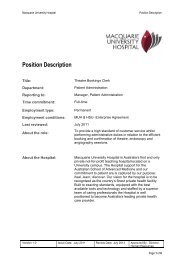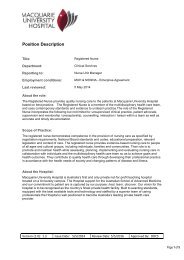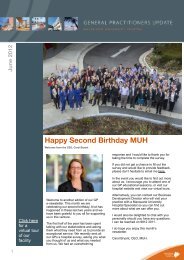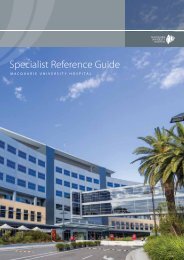Plenary Oral Presentations - Macquarie University Hospital
Plenary Oral Presentations - Macquarie University Hospital
Plenary Oral Presentations - Macquarie University Hospital
You also want an ePaper? Increase the reach of your titles
YUMPU automatically turns print PDFs into web optimized ePapers that Google loves.
16 th International Meeting of the Leksell Gamma Knife ® SocietyMarch 2012, Sydney, AustraliaMA-180Evaluation of mini-mental status examination score obtainedafter using gamma knife radiosurgery as the initial radiationtreatment for brain metastasesKiyoshi NakazakiDepartment of Neurosurgery, Brain Attack Center Ota Memorial <strong>Hospital</strong>Objective: This study aimed to evaluate (1) the mini-mental status examination scores (MMSEs) ofpatients with brain metastases, after they underwent gamma knife radiosurgery (GKS) without wholebrainradiation treatment (WBRT) and (2) the factors influencing MMSEs.Methods: Between January 2009 and June 2011, all patients with new brain metastases, i.e., 119patients, were treated using 1 session of GKS without WBRT as initial radiation therapy. MMSEswere determined for all patients before GKS and for the surviving patients at every 3 months afterGKS.Results: We could evaluate 76 patients (63.9%) after GKS. The median age, number of brain metastases,and total volume of brain metastases were 65.5 years (range, 40–92 years), 2 (range, 1–18), and4.17 ml (range, 0.04–27.0 ml), respectively. The median values for marginal dose, total skull integraldose, and MMSE follow-up time were 22.0 Gy (range, 14–24 Gy), 2.9 joules (range, 0.1–9.6 joules),and 5.8 months (range, 0.9–21.6 months), respectively.Thirty-nine patients (51.3%) developed newdistant lesions after the first GKS. The median survival time with or without follow-up MMSEs was8.8 and 2.8 months, respectively.The median pre-GKS MMSE in cases where follow-up MMSEs were obtained was 28 (range, 3–30).Thirty-eight patients (50.0%) had a pre-GKS MMSE of 3 points and those of 15 patients (19.7%) deteriorated by >3 points. For 4of these 15 patients, the cause of deterioration was not directly related with brain metastases; for 4of the remaining 11 patients, the deterioration in MMSEs recovered to within 3 points. The 6- and12-month actual free rates of the 3-point drop in the MMSEs were 83.9% (47 of 56 cases) and 79.2%(19 of 24 cases), respectively. Larger tumor volume was associated with an improvement of >3 pointsin the follow-up MMSE. No risk factors were significantly associated with a deterioration of >3 pointsin the follow-up MMSEs.Conclusion: GKS stabilizes neurocognitive function with less adverse effects. The mental deteriorationof patients with large symptomatic metastatic tumors tends to decrease after GKS.44
















